iMore survey shows ultra-high levels of Apple Watch usage
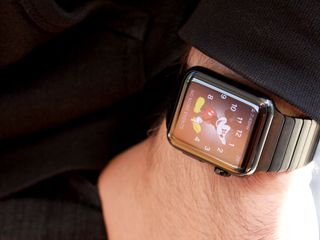
There's been a lot of debate over how well the Apple Watch is selling. That's to be expected. Apple not only launched a new product category but the category itself is still new. Even with hard numbers, there would be very little in the way of context to understand what they mean and that won't change for a year or more. That's why, for iMore's inaugural Apple Watch survey, we chose to focus on something else entirely—not how the Apple Watch is doing but what we're all are doing with it.
For two weeks in July we collected answers using Survey Monkey and over 8000 of you were kind enough to respond. Here's what you told us.

Who's using the Apple Watch?
We asked some basic demographic information to get started. 11% identified as female, which is far less than the 36% that make up iMore's U.S. audience, according to Quantcast. 70% came from the U.S., which is more than the 50% Quantcast measures. So this survey skewed more towards males in the U.S. than our typical readership.
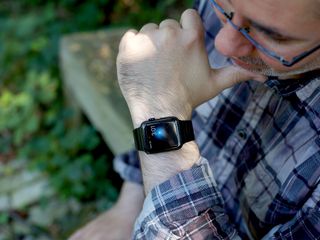
31% said they were in their 30s, compared to 22% in their 40s, 20% in their 20s, 12% in their 50s, 9% over 60, and 6% under the age of 20. The scale we used for age doesn't match the one Quantcast uses so a direct comparison there isn't possible. We'll correct that in a future survey.
Which Apple Watches are people using?
The Apple Watch was announced in September of 2014, shown off again in March of 2015, and shipped in April of 2015. Quantities were limited from the outset and some models, including the space black stainless steel and pink sport, took much longer to ship then others.
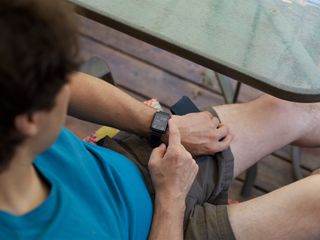
That said, 30% of our readers received their Apple Watch in June. 27% received it in April, 22% in May, and 20% in July. The vast majority of our readers, 80% in all, got 42 mm models. 20% got 38mm.
- 48% got space gray aluminum.
- 26% got polished stainless steel.
- 20% got silver aluminum.
- 4% got space black.
- Below 1% got yellow gold.
- Below 1% got rose gold.
While every Apple Watch came with a band, additional bands could also be bought separately. As with the Watches, some bands were more highly constrained than others. Modern buckles, for example, became available for individual purchase in August, after our survey ended. Space black link bracelets and Edition bands have not been made available for separate purchase.
Master your iPhone in minutes
iMore offers spot-on advice and guidance from our team of experts, with decades of Apple device experience to lean on. Learn more with iMore!
- 88% own a sport band.
- 13% own a Milanese loop.
- 10% own a leather loop.
- 6% own a link bracelet.
- 6% own a classic buckle.
- 2% own a modern buckle accounted.
Apple made Watch bands easy to switch. 16% said they change the watch bands occasionally. 11% change weekly and 8%, daily. AppleCare was purchased by just over 40%.
How much do people use the Apple Watch?
The reason we didn't run a popularity or satisfaction survey is because iMore is frequented by Apple customers and people invested in the Apple ecosystem. Given that, a usage survey seemed ideally suited to our readership. Still, based on some of the media coverage, we weren't sure what kind of numbers we'd get. It turns out, we got high ones.

93% of those who took the iMore survey wear the Apple Watch 5 or more days a week. 95% wear their Apple Watch for 8 hours or more a day and 79% wear it for 12 hours or more a day. Next we asked which features are most important to our readers.
- 98% say notifications are the most important.
- 84% say timekeeping.
- 77% say health and fitness.
- 72% say communications.
- 44% say Apple Pay and Passbook.
- 42% say information lookup (calendar, maps, stocks, weather, etc.).
- 23% say remote control or home automation.
Since usage doesn't exist in a vacuum we did want to ask how well the major features were working for our readers. Reliability may be only one factor that determines usability, but it's an important one.
- 98% found notifications to be reliable.
- 90% found Move tracking to be reliable.
- 86% found Siri to be reliable.
- 84% found Exercise tracking to be reliable.
- 84% found Stand tracking to be reliable.
- 79% found Workout tracking to be reliable.
- 72% found app loading/updating to be reliable.
- 60% found Apple Pay to be reliable.
App performance is currently constrained by the Bluetooth and Wi-Fi connection that has to transfer processing and other logic between iPhone and Apple Watch. For Apple Pay, I wish that we'd broken out where reliability issues were occurring, on-device or with the NFC terminals at retail. Likewise, what issues were being experienced in Workouts.
The Apple Watch includes a new interface paradigms in the digital crown and Force Touch, but also skews more towards Siri for voice control and dictation for text input than any previous Apple product. We were curious how that worked out in the real world.
- 99% use the Digital Crown, 82% use it daily, and 68% use it several times a day or more.
- 99% use Force Touch, 78% use it daily, and 31% use it several times a day or more.
- 95% use Siri, 50% use it daily, and 31% who use it several times a day or more.
- 88% use Dictation, 42% use it daily, and 26% use it several times a day or more.
The Digital Crown is primarily used to return to the clock face or home screen, to scroll through options, sometimes to zoom, and sometimes to commit changes. Force Touch is used to bring up contextual menus of important but non-critical options. Siri is used to retrieve information and perform actions. Dictation is used for speech-to-text.
Some of those are frequent and routine tasks. Others depend more on the context of use. I wish we'd asked how the navigation methods were being used—digital crown for returning to clock face vs. scrolling lists—so we could gain greater insight. We'll strive to include that in a future survey.
How do people keep time on the Apple Watch?
The Apple Watch isn't a watch the same way the iPhone is a phone. On the iPhone, the phone is just an app. On the Apple Watch, timekeeping is almost its own interface mode. That's an indicator of how important Apple thinks it is and what sort of primacy it requires on the wrist.

So, we wanted to find out not just how our readers kept time but how they customized their time-keeping. Almost 37% change their clock face weekly. 18% change monthly, and 13% change daily.
- 56% use the Modular clock face at least occasionally.
- 55%use the Utility clock face.
- 21% use the Simple clock face.
- 19% use the Chronograph clock face.
- 18% use the Mickey Mouse clock face.
- 18% use the Color clock face.
- 13% use the Solar clock face.
- 12% use the Astronomy clock face.
- 10% use the Motion clock face.
- 7% use the X-Large clock face.
X-Large is also used for accessibility so it has importance beyond the raw number.
Most clock faces allow for complications and a few allow for several complications. Over 19% change their clock faces and/or complications either for weekends or for school, and 12% either for workouts or when at home.
- 81% use date.
- 78% use weather.
- 71% use activity.
- 60% use calendar.
- 54%, use battery.
- 18% use sunset/sunrise.
- 12% use moon-phase.
- 6% use stocks.
The Apple Watch also includes several other time keeping features. On iOS, they're all bundled together in the Clock app. On the Apple Watch, there are distinct Alarm, Timer, Stop Watch, and World clock apps.
- 80% use the Alarm app, 40% daily or more. 18% use the Alarm complication.
- 88% use the Timer, 27% daily or more. 22% use the Timer complication.
- 65% use the Stop Watch, 8% daily or more. 10% use the Stop Watch complication.
- 57% use the World Clock, 14% daily or more. 16% use the World Clock complication. 45% use the World Clock glance.
How do people stay connected with the Apple Watch?
Dick Tracy, James Bond, Michael Knight, and countless other sci-fi characters have made many of us long for the ability to use our watches as a communicator. That's why it's no surprise so many of us do. Likewise Messages.

Mail was more interesting because the current version of watch OS makes it read-only. (Sending mail is coming with watch OS 2 this fall.) Sketches, Taps, and Heartbeats only work with another Apple Watch owner, so with that in mind at least occasional usage still seems high.
- 91% take and make phone calls, 36% daily or more.
- 99% send and receive Messages, 84% daily or more.
- 86% read Mail, 59% daily or more.
- 51% send and receive Sketches, 10% daily or more.
- 58% send and receive Taps, 19% daily or more.
- 55% send and receive Heartbeats, 17% daily or more.
We didn't break out sending and receiving—how many people use the Apple Watch to handle incoming communications versus how many initiate communications. That's something I hope we can ask about in the future.
How do people keep informed with the Apple Watch?
The original PDAs were literally personal digital assistants meant to help with information management—namely our contacts, calendars, and the like. The iPhone added internet information to the mix, with widget-like apps to keep track of weather, stocks, and more. The Apple Watch carriers on many of these functions. Unlike the iPhone, however, the Apple Watch doesn't have a web browser or web rendering capabilities. That makes it dependent on apps as a front end for web data.
- 97% check the weather, 74% daily or more.
- 89% check Maps, 19% daily or more.
- 94% check theirs calendars, 64% daily or more.
- 41% check stocks, 15% daily or more.
How do people stay healthy and fit with their Apple Watches?
Quantified life in general and fitness trackers in particular have gained attention over recent years. Passive accountability has always been a strong motivator for some, but with the Apple Watch that accountability has also become active. We were curious how, if at all, this helped people change their behaviors.
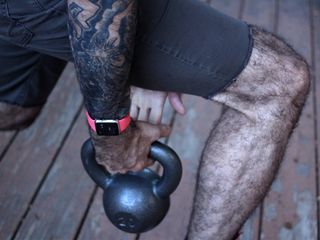
For the Stand alert, we wanted to know if people used it, if they turned it off, or if they left it on but simply ignored it. (Like gym memberships, sometimes having is easier than using.)
- 25% stand up every time they get an alert.
- 46% stand up most of the time.
- 15% stand up some of the time or less.
- 14% turn them off.
- 1% leave them on but ignore them.
Getting 86% of people up and moving around, even some of the time, is terrific. Getting 71% up most of the time is beyond terrific.
The Apple Watch also tries to get owners to hit 30 minutes of brisk exercise a day. While the time doesn't change, getting your heart rate up and keeping it up for those 30 minutes is what counts.
- 38% achieve their exercise goal 5-7 days a week.
- 26% achieve it 3-4 days a week.
- 16% achieve it 1-2 days a week.
- 12% don't use it.
88% of people at least keeping aware of their activity is likewise heartening. 64% achieving their goal more than 3 times a week is inspiring.
Move goals, which counts calories burned, can be set and adjusted over time. Here the goal isn't to do strenuous exercise but just to keep moving.
- 52% achieve their move goal 5-7 days a week.
- 28% achieve it 3-4 days a week.
- 8% achieve it 1-2 days a week.
- 12% don't use it.
That's over 88% who monitor the move ring, and over 80% who achieve their calorie burning goals at least 3 days a week. I do wish we'd asked about general fitness levels and behavior as well, to try and get a better idea of what kind of changes, if any, took place with Apple Watch usage, but every survey is a balance of how much you can ask before people stop answering.
For the Workout app, we simply asked what types of workouts people were using. Since the Workout app has an "Other" category, we included it.
- 64% track outdoor walks
- 32% track outdoor runs.
- 38% track "other" workouts.
- 25% track indoor walks.
- 16% track indoor runs.
- 15 % track elliptical.
- 7% track stairs.
- 5% track rowing.
- 14% don't use it.
I hope we can explore "other" in more detail in the future to find out what kinds of workouts are being tracked that the Apple Watch doesn't already break out.
How do people use Passbook and Apple Pay on the Apple Watch?
Passbook, which will change names to Wallet as part of watchOS 2 this fall, collects together cards, tickets, and other passes, as well as credit and debit cards as part of Apple Pay. We wanted to know how our readers were using it.
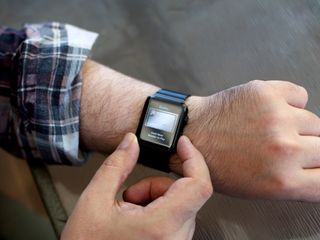
- 48% use Passbook to pay for purchases at stores like Starbucks.
- 28% use it for boarding passes at airports and other travel stations.
- 22% for ticketing at movie theaters or other events.
- 36% don't use it.
Unlike Passbook, which can be used everywhere, Apple Pay has only been available in the U.S. since last October and in the U.K. since June. Availability also depends on the card issuer and the point of purchase. That made it tougher to ask about usage numbers.
- 32% use Apple Pay always, if available.
- 12% use it frequently, if available.
- 18% use it occasionally, if available.
- 12% don't use it, even if available.
- 21% can't use it because it's not available to them.
All told, that's 62% using Apple Pay at least occasionally or more on their Apple Watch.
How do people use notifications on the Apple Watch?
Convenience has often been cited as one of the primary reasons to use an Apple Watch, and notifications as one of the primary conveniences.
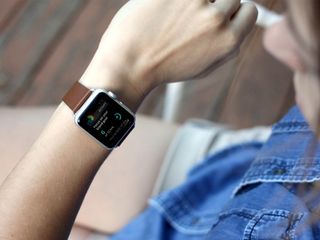
We weren't just curious about whether or not our readers use notifications, because we suspected they do in droves, but how they set up their notifications. Apple Watch allows for sound, haptic "taps", both, or neither.
- 99% use Messages alerts, 49% with sound and haptics, 2% just sound, 48% just haptics.
- 93% use Reminders alerts, 44% with sound and haptics, 3% just sound, 46% just haptics.
- 93% use Activity alerts, 44% with sounds and haptics, 2% ust sound, 48% just haptics.
- 91% use Calendar alerts, 41% with sound and haptics, 3% just sound, and 47% just haptics.
- 77% use Mail alerts, 35% with sound and haptics, 3% just sound, 40% just haptics.
We didn't ask, but it'd be interesting to see how many people leave on sound to make absolutely sure they don't miss an alert and how many go haptics-only to make notifications less obtrusive. Also, there's no built-in Reminders app on Apple Watch as there is on iOS and OS X, so notifications is the only way to stay on top of them unless and until your install an App Store app.
How do people use glances on the Apple Watch?
Notifications are bits of data that appear briefly, on top of any screen, to alert you to some bit of presumably important information. Glances are bits of data that persist in a defined space, waiting for you to seek them out.

Where notifications are push, glances are pull. That made for an interesting comparison. Glances can also be uninstalled, so we asked about that as well.
- 86% use the Activity glance , 63% daily or more. 7% don't use it, 7% uninstalled it.
- 86% use the Heartbeat glance, 36% daily or more. 9% don't use it, 4% uninstalled it.
- 85% use the Weather glance, 58% daily or more. 6% don't use it, 9% uninstalled it.
- 85% use the Battery glance, 48% daily or more. 10% don't use it, 5% uninstalled it.
- 82% use the Now Playing glance, 44%daily or more. 13% don't use it, 5% uninstalled it.
- 45% use the World Clock glance, 11.35% daily or more. 26% don't use it, 29% uninstalled it.
- 82% use the Calendar glance, 50% daily or more. 8% don't use it, 10% uninstalled it.
- 36% use the Stocks glance, 14% daily or more. 29% don't use it, 36% uninstalled it.
- 35% use the Maps glance, 11% daily or more. 15% don't use it, 20% uninstalled it.
We didn't ask about App Store glances in this survey but will in the future.
How do people use apps on the Apple Watch?
Apple Watch apps are currently extensions that have their interface on the Watch but their logic on the iPhone. Native apps will be coming with watchOS 2 this fall, but for now all processing needs to be done on the iPhone. That makes Apple Watch apps slower to load and prevents most functionality from working when disconnected from the iPhone.
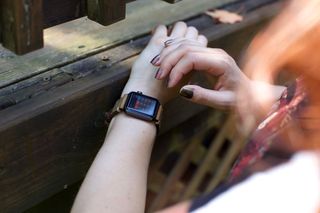
Limited as they are, that didn't stop almost all Apple Watch owners from using them, and a majority from having under ten installed.
- 29% have 6-10 apps installed.
- 26% have 11-20 apps installed.
- 23% have 1-5 apps installed.
- 15% have 20 or more.
That means 94% of readers have App Store apps installed, 71% have more than 5 installed, and 42% have more than 10 installed. As developers get better at making apps specifically for the watch, and the apps themselves get better with watchOS 2 and subsequent versions, it'll be interesting to see how those numbers change.
When it comes to the type of apps being used usage varied. Since many types of apps fall into multiple categories, there's likely to be significant overlap. I wish we'd asked about occupations so we could provide better context around usage here as well. Business apps, for example, may not be used as much by the general population, but they're likely to be incredibly important to those in business.
- 74% use health and fitness apps with 34% using them daily or more. 24% don't use them.
- 72% use utilities with 19% using them daily or more. 25% don't use them.
- 69% use productivity apps with 26% using them daily or more. 27% don't use them.
- 66% use social networking apps with 25% using them daily or more. 31% don't use them.
- 63% use news apps with 24% using them daily or more. 34% don't use them.
- 60% use lifestyle apps with 14% using them daily or more. 38% don't use them.
- 46% use business apps with 13% using them daily or more. 50% don't use them.
- 40% use finance apps with 40% with 9% using them daily or more. 56% don't use them.
- 47% use food and drink apps with 7% using them daily. 49% don't use them.
- 56% use travel apps with 6% using them daily or more. 39% don't use them.
- 31% play games with 5% playing them daily or more. 65% don't play them.
Which apps are people using on the Apple Watch?
Instead of asking which five apps our readers had installed on their Apple Watches, we asked which were their favorite or most-used apps. The idea was to try to get to the apps that really resonated on the wrist.
- 10.79% Dark Sky
- 8.34% Overcast
- 8.28% Twitter
- 7.11% 1Password
- 7.09% Fantastical
- 6.49% Instagram
- 6.20% Shazam
- 4.41% Starbucks
- 3.47% Uber
- 3.41% MLB at Bat
- 3.33% Weather
- 3.22% ESPN
- 3.22% Philips Hue
- 3.20% Evernote
- 3.08% Calcbot
- 3.06% Omnifocus
- 2.60% Yelp
- 2.54% Nike+ Running
- 2.50% Deliveries
- 2.45% Runkeeper
- 2.43% MyFitnessPal
- 2.37% CNN
- 2.27% Clear
- 2.14% Mail
- 2.06% Swarm
- 2.02% New York Times
- 1.81% Wunderlist
- 1.77% Things
- 1.77% Workout
- 1.75% PCalc
- 1.68% Yahoo Weather
- 1.60% Strava
- 1.58% The Weather Channel
- 1.56% Weather Underground
- 1.54% BBC News
- 1.50% Spark
- 1.46% Ebay
- 1.46% Slack
- 1.31% Citymapper
- 1.27% Amazon
- 1.23% Authy
- 1.23% Due
- 1.10% Flipboard
- 1.04% Pandora
- 0.94% Twitterrific
- 0.92% MacID
- 0.92% Microsoft Outlook
- 0.92% Todoist
- 0.89% Timer
- 0.89% Withings
Which apps, not already on the Apple Watch, are people waiting for?
We also asked which five apps that aren't currently available for Apple Watch our readers are most looking forward to.
- 21.48% Facebook
- 9.50% Tweetbot
- 9.15% Whatsapp
- 7.48% Facebook Messenger
- 6.17% Nest
- 5.48% Reminders
- 4.89% Snapchat
- 4.62% Google Maps
- 4.62% Spotify
- 3.84% Notes
- 3.37% Find My Friends
- 3.37% Waze
- 2.86% Sonos
- 2.80% Podcasts
- 2.03% Youtube
- 1.85% Imore
- 1.82% Audible
- 1.79% Google Hangouts
- 1.67% Chase Bank
- 1.64% Microsoft Outlook
- 1.49% Fitbit
- 1.31% Downcast
- 1.28% Reeder
- 1.28% Wemo
- 1.25% Apple News
- 1.22% Gmail
- 1.19% Calculator
- 1.19% Find My Iphone
- 1.19% Google Search
- 1.13% Mailbox
- 1.13% Voice Memos
- 1.07% Bank Of America
- 1.01% Inbox By Gmail
- 0.95% Google Authenticator
- 0.92% Netflix
- 0.89% Wells Fargo
- 0.86% Anylist
- 0.86% Apple Music
- 0.83% Google Translate
- 0.83% Harmony Remote
- 0.83% Linkedin
- 0.80% Facetime
- 0.77% Safari
- 0.77% Xbox One Smartglass
- 0.71% Pocket Casts
- 0.69% Plex
- 0.69% Pocket
- 0.69% Vine
- 0.69% Weather Line
State of the Apple Watch
I expected high numbers for general usage on the Apple Watch but the numbers we saw, especially how much people are wearing it daily and hourly, were even higher than I expected. Notification, communication, and health and fitness are often cited as principle reasons people use their Apple Watch. The motivational aspects of the health and fitness apps, however, were impressive. We need to dig deeper into those and find out how much change affect it's having.
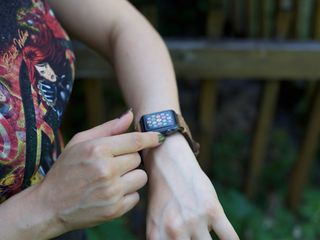
Some areas proved harder to measure than we anticipated. Areas like stocks reported low usage but that doesn't give a sense of how many people who consider Stocks important use them on Apple Watch. That's true of every category, but the smaller the niche, the more important it feels. That's especially true with apps as well. Likewise Apple Pay, given it's a feature not everyone can yet be used by everyone or everywhere. Getting more granular there would help break that out better.
Going forward watchOS 2 will offer substantial new functionality, including App Store complications, Time Travel, and most importantly, native apps. That could change several areas of usage so we'll run the survey again next quarter and see what's developed.
Thanks to everyone who took part. We very much look forward to continuing to share even more insight in the near future!

Rene Ritchie is one of the most respected Apple analysts in the business, reaching a combined audience of over 40 million readers a month. His YouTube channel, Vector, has over 90 thousand subscribers and 14 million views and his podcasts, including Debug, have been downloaded over 20 million times. He also regularly co-hosts MacBreak Weekly for the TWiT network and co-hosted CES Live! and Talk Mobile. Based in Montreal, Rene is a former director of product marketing, web developer, and graphic designer. He's authored several books and appeared on numerous television and radio segments to discuss Apple and the technology industry. When not working, he likes to cook, grapple, and spend time with his friends and family.